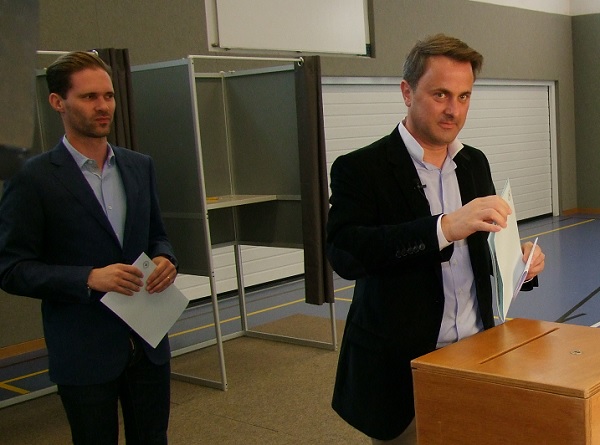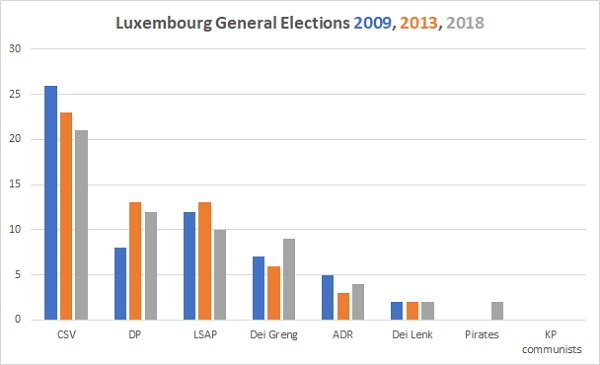 Xavier Bettel, Prime Minister, casting his vote on Sunday 14 October 2018;
Xavier Bettel, Prime Minister, casting his vote on Sunday 14 October 2018;
In Sunday's general election, the Greens gained 3 seats while the CSV, DP and LSAP all lost seats, meaning no party has an absolute majority.
As more voters than ever participated than ever before - 259,896 voters cast their ballots compared to 175,425 in 2013 and 161,344 in 2009 - the CSV remained the largest party with 21 seats (down from 23), with the DP dropping from 13 to 12, the Greens increasing from 6 to 9 and the LSAP dropping from 13 to 10.
The ADR increased from 3 to 4, Dei Lenk remained at 2 and the Pirate Party saw two of their candidates elected for the first time.
While no party gained the magic number of 31 seats - to have a simple majority in the parliament of 60 elected representatives - the CSV party was predicted to earn back one or more of the 3 seats it lost in the 2013 election; instead, it lost a further 2 seats.
The DP party, having led the 3-way coalition in the outgoing government lost just one of the 5 seats in gained in the 2013 election and can be very pleased with its performance - it had been tipped to lose more seats primarily due to its poor reputation in the education sector and its unpopular handling with the reform of parish councils; however, the country has shown positive economic growth during Xavier Bettel's charismatic leadership.
But the Ministry of the Economy has been led by Etienne Schneider. The popularity of the party continues to slide, despite the fact that it fought for, and brought back in, automatic indexation of salaries, and Schneider has been credited internationally as "Space Cowboy" for putting the Grand Duchy at the forefront of space technology (asteroid mining, etc.). Despite Jean Asselborn having a high profile nationally as well as internationally, as Minister for Foreign and European Affairs, the LSAP continued their slide in the polls as first witnessed two years ago in the local elections.
The Green party almost, but not quite, managed to become the 3rd largest party, just making up for the loss of 1 seat in 2013 to regaining that and adding two more, with the LSAP continuing its poor showing in the local elections two years ago to end up with 10 seats. So why did the Dei Greng (the Green party) show a considerable increase at the polls this time out? The tram is now operational - at least, the first two phases are - and the funicular and new Pfaffenthal railway station are taking some of the pressure off Luxembourg-gare. It is unlikely that the significant increase in the network of cycle paths has swayed voter sentiment; but maybe the timing of last week's global environmental report came at the right time for the party? However, it may not be enough to see them stay in government.
So where to now?
Option #1: the CSV, as the largest party, could choose to open coalition discussions with either the DP (as the 2nd largest party) or the LSAP (as the 3rd largest party) - discussing with the Greens would not give the CSV-led coalition the required 31 seats.
Option #2: the DP, as the 2nd largest party, could choose to open coalition discussions with the Greens and the LSAP - together they would have 31 seats.
However, the political climate is different now to what it was in 2013 when the DP, LSAP and Greens consciously excluded the CSV from coalition discussions as they unanimously agreed that a change from a CSV-led government was needed.
So it looks most likely that the CSV will choose to open negotiations with the DP or possibly with the LSAP - watch this space!

One possible reason for CSV's failure to do better in the elections could be based on the popularity of its leadership. In the 2013 elections, Jean-Claude Juncker topped the popularity polls with 55,968 votes, with Claude Wiseler attracting 26,590 votes. This time round, with no Jean-Claude Juncker in the picture, Claude Wiseler attracted 27,388 votes, just a small percentage increase and nowhere near the 55k votes his predecessor as party leader attracted.
Meanwhile, the second-most popular politician in the 2013 elections, Jean Asselborn, has become the popular, with 40,283 votes this time round compared to 38,257 in 2013. This, however, will not be enough for his party to remain in any government coalition.
The current Prime Minister, Xavier Bettel, received a small drop in personal votes from 32,064 in 2013 to 30,774 in 2018.








